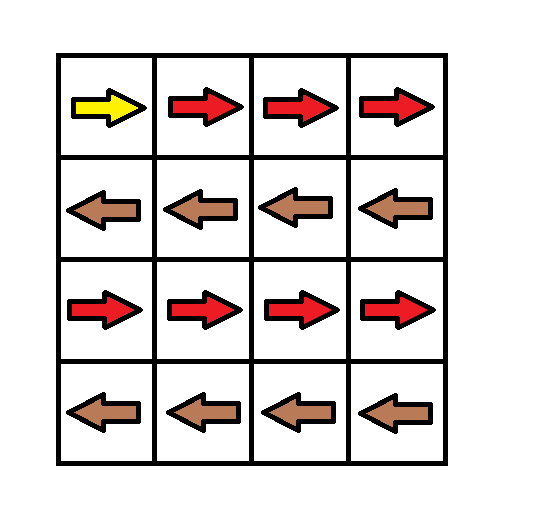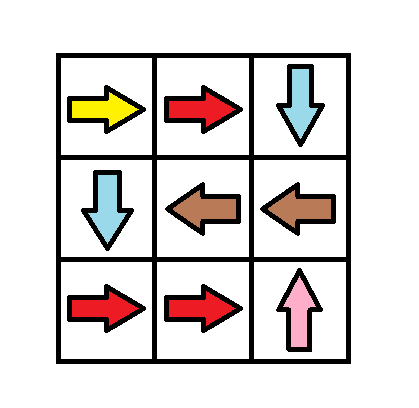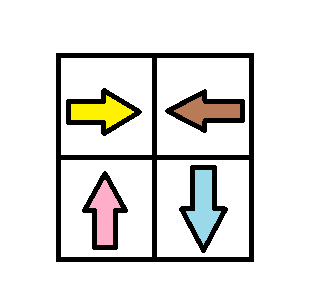| comments | difficulty | edit_url | rating | source | tags | ||||||
|---|---|---|---|---|---|---|---|---|---|---|---|
true |
困难 |
2068 |
第 178 场周赛 Q4 |
|
给你一个 m x n 的网格图 grid 。 grid 中每个格子都有一个数字,对应着从该格子出发下一步走的方向。 grid[i][j] 中的数字可能为以下几种情况:
- 1 ,下一步往右走,也就是你会从
grid[i][j]走到grid[i][j + 1] - 2 ,下一步往左走,也就是你会从
grid[i][j]走到grid[i][j - 1] - 3 ,下一步往下走,也就是你会从
grid[i][j]走到grid[i + 1][j] - 4 ,下一步往上走,也就是你会从
grid[i][j]走到grid[i - 1][j]
注意网格图中可能会有 无效数字 ,因为它们可能指向 grid 以外的区域。
一开始,你会从最左上角的格子 (0,0) 出发。我们定义一条 有效路径 为从格子 (0,0) 出发,每一步都顺着数字对应方向走,最终在最右下角的格子 (m - 1, n - 1) 结束的路径。有效路径 不需要是最短路径 。
你可以花费 cost = 1 的代价修改一个格子中的数字,但每个格子中的数字 只能修改一次 。
请你返回让网格图至少有一条有效路径的最小代价。
示例 1:
输入:grid = [[1,1,1,1],[2,2,2,2],[1,1,1,1],[2,2,2,2]] 输出:3 解释:你将从点 (0, 0) 出发。 到达 (3, 3) 的路径为: (0, 0) --> (0, 1) --> (0, 2) --> (0, 3) 花费代价 cost = 1 使方向向下 --> (1, 3) --> (1, 2) --> (1, 1) --> (1, 0) 花费代价 cost = 1 使方向向下 --> (2, 0) --> (2, 1) --> (2, 2) --> (2, 3) 花费代价 cost = 1 使方向向下 --> (3, 3) 总花费为 cost = 3.
示例 2:
输入:grid = [[1,1,3],[3,2,2],[1,1,4]] 输出:0 解释:不修改任何数字你就可以从 (0, 0) 到达 (2, 2) 。
示例 3:
输入:grid = [[1,2],[4,3]] 输出:1
示例 4:
输入:grid = [[2,2,2],[2,2,2]] 输出:3
示例 5:
输入:grid = [[4]] 输出:0
提示:
m == grid.lengthn == grid[i].length1 <= m, n <= 100
本题实际上也是最短路模型,只不过求解的是改变方向的最小次数。
在一个边权只有 0、1 的无向图中搜索最短路径可以使用双端队列进行 BFS。其原理是当前可以扩展到的点的权重为 0 时,将其加入队首;权重为 1 时,将其加入队尾。
如果某条边权值为 0,那么新拓展出的节点权值就和当前队首节点权值相同,显然可以作为下一次拓展的起点。
class Solution:
def minCost(self, grid: List[List[int]]) -> int:
m, n = len(grid), len(grid[0])
dirs = [[0, 0], [0, 1], [0, -1], [1, 0], [-1, 0]]
q = deque([(0, 0, 0)])
vis = set()
while q:
i, j, d = q.popleft()
if (i, j) in vis:
continue
vis.add((i, j))
if i == m - 1 and j == n - 1:
return d
for k in range(1, 5):
x, y = i + dirs[k][0], j + dirs[k][1]
if 0 <= x < m and 0 <= y < n:
if grid[i][j] == k:
q.appendleft((x, y, d))
else:
q.append((x, y, d + 1))
return -1class Solution {
public int minCost(int[][] grid) {
int m = grid.length, n = grid[0].length;
boolean[][] vis = new boolean[m][n];
Deque<int[]> q = new ArrayDeque<>();
q.offer(new int[] {0, 0, 0});
int[][] dirs = {{0, 0}, {0, 1}, {0, -1}, {1, 0}, {-1, 0}};
while (!q.isEmpty()) {
int[] p = q.poll();
int i = p[0], j = p[1], d = p[2];
if (i == m - 1 && j == n - 1) {
return d;
}
if (vis[i][j]) {
continue;
}
vis[i][j] = true;
for (int k = 1; k <= 4; ++k) {
int x = i + dirs[k][0], y = j + dirs[k][1];
if (x >= 0 && x < m && y >= 0 && y < n) {
if (grid[i][j] == k) {
q.offerFirst(new int[] {x, y, d});
} else {
q.offer(new int[] {x, y, d + 1});
}
}
}
}
return -1;
}
}class Solution {
public:
int minCost(vector<vector<int>>& grid) {
int m = grid.size(), n = grid[0].size();
vector<vector<bool>> vis(m, vector<bool>(n));
vector<vector<int>> dirs = {{0, 0}, {0, 1}, {0, -1}, {1, 0}, {-1, 0}};
deque<pair<int, int>> q;
q.push_back({0, 0});
while (!q.empty()) {
auto p = q.front();
q.pop_front();
int i = p.first / n, j = p.first % n, d = p.second;
if (i == m - 1 && j == n - 1) return d;
if (vis[i][j]) continue;
vis[i][j] = true;
for (int k = 1; k <= 4; ++k) {
int x = i + dirs[k][0], y = j + dirs[k][1];
if (x >= 0 && x < m && y >= 0 && y < n) {
if (grid[i][j] == k)
q.push_front({x * n + y, d});
else
q.push_back({x * n + y, d + 1});
}
}
}
return -1;
}
};func minCost(grid [][]int) int {
m, n := len(grid), len(grid[0])
q := doublylinkedlist.New()
q.Add([]int{0, 0, 0})
dirs := [][]int{{0, 0}, {0, 1}, {0, -1}, {1, 0}, {-1, 0}}
vis := make([][]bool, m)
for i := range vis {
vis[i] = make([]bool, n)
}
for !q.Empty() {
v, _ := q.Get(0)
p := v.([]int)
q.Remove(0)
i, j, d := p[0], p[1], p[2]
if i == m-1 && j == n-1 {
return d
}
if vis[i][j] {
continue
}
vis[i][j] = true
for k := 1; k <= 4; k++ {
x, y := i+dirs[k][0], j+dirs[k][1]
if x >= 0 && x < m && y >= 0 && y < n {
if grid[i][j] == k {
q.Insert(0, []int{x, y, d})
} else {
q.Add([]int{x, y, d + 1})
}
}
}
}
return -1
}function minCost(grid: number[][]): number {
const m = grid.length,
n = grid[0].length;
let ans = Array.from({ length: m }, v => new Array(n).fill(Infinity));
ans[0][0] = 0;
let queue = [[0, 0]];
const dirs = [
[0, 1],
[0, -1],
[1, 0],
[-1, 0],
];
while (queue.length) {
let [x, y] = queue.shift();
for (let step = 1; step < 5; step++) {
let [dx, dy] = dirs[step - 1];
let [i, j] = [x + dx, y + dy];
if (i < 0 || i >= m || j < 0 || j >= n) continue;
let cost = ~~(grid[x][y] != step) + ans[x][y];
if (cost >= ans[i][j]) continue;
ans[i][j] = cost;
if (grid[x][y] == step) {
queue.unshift([i, j]);
} else {
queue.push([i, j]);
}
}
}
return ans[m - 1][n - 1];
}

